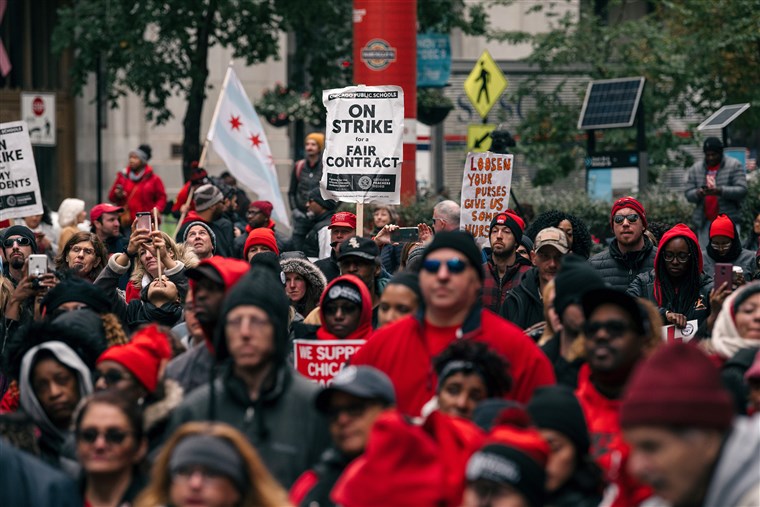The Chicago Teachers Union Victory

The Chicago Teachers Union victory is a big one in the recent strike wave. I didn’t write about it much because I didn’t have a lot to say that others weren’t saying better. And also because this semester is hell and I don’t have a lot of time. But I did want to at least link to this Rebecca Burns celebration at In These Times.
Over the course of an often-bitter battle, CTU and its sister union, SEIU 73, overcame a series of such ultimatums from the recently elected mayor. Before the strike, Lightfoot had refused to write issues such as staffing increases or class size caps into a contract at all. Following a budget address last week, Lightfoot vowed that there was no more money left for a “bailout” of the school district. But a tentative agreement approved by CTU delegates Wednesday night requires the school district to put a nurse and social worker in every school within five years and allocates $35 million more annually to reduce overcrowded classrooms. Both unions also won pay bumps for support staff who have made poverty wages.
Yet these substantial gains still fell short of what many members had hoped to achieve, given that they were fighting for basic investments already enjoyed by most suburban school districts—investments that Lightfoot herself had campaigned on this spring.
“It took our members 10 days to bring these promises home,” CTU Vice President Stacy Davis Gates told reporters after an agreement was reached over instructional days. “But I want to tell my members: They have changed Chicago.”
Members of SEIU 73 ratified their contract this week, and CTU members will now have 10 days to do so. But the impact of the two-week walkout is likely to extend far beyond the contracts themselves.
During daily rallies that drew tens of thousands of teachers, staff and supporters, the unions repeatedly made the argument that there was plenty of wealth in the city to invest in schools and public services—it was just concentrated in the wrong hands. They also touched on what’s often a third-rail for public-sector unions, criticizing the resources lavished on police at their expense. The strike’s momentum will carry over most immediately into a budget battle with Lightfoot, with the teachers’ union partnering with a larger coalition fighting to tax corporations and luxury real-estate at a higher rate in order to fund affordable housing, public mental health clinics and other services.
The teachers union also shone a light on an opaque financing tool known as Tax Increment Financing, or TIF, that’s intended to funnel additional property tax dollars to “blighted” areas, but that critics say is akin to a “corporate slush fund.” On Tuesday, nine CTU members were arrested at the headquarters of Sterling Bay to protest the city’s decision to award the Wall-Street backed developer more than $1 billion of TIF subsidies earlier this year.
“That day in and of itself was huge because we were able to call out the city’s hypocrisy,” says Roxana González, an 8th-grade teacher at Dr. Jorge Prieto Math and Science Academy who was among those arrested. “The fight to fund what our communities need is a much longer one than our contract fight, and teachers across the city are going to continue to be a part of it.”
The two-week walkout will also likely have reverberations for teachers and other union members outside of Chicago. The CTU’s 2012 strike helped inspire a national network called “Bargaining for the Common Good” that has brought together unions seeking to expand the scope of contract bargaining beyond pay and benefits.
“In many ways this was both the toughest and most visionary strike fought yet on the principals of Bargaining for the Common Good,” says Joseph McCartin, the director of the Kalmanovitz Initiative for Labor and the Working Poor at Georgetown University.
“The union engaged in some effective popular education about the structural issues of school underfunding that it can follow up on in the future. Although it was a difficult fight, the CTU has come away with gains that will make the schools better and encourage teachers elsewhere to fight for similar things.”
The strike wave continues without a serious loss or even real challenge to teachers. So long as they stick together, they win. And a huge part of this is that they are fighting not only for higher wages (and sometimes not even demanding them) but for their own students and for our communities decimated by neoliberalism and, increasingly, fascism. Putting Lori Lightfoot’s corporate hackery in its place is a good thing on its own too. I hope the CTU continues to lead the fight for a better Chicago. They didn’t win everything and only 60% of the membership agreed to the new contract. But to me, that’s a good thing, a sign that a fighting force of teachers is ready for the next struggle, which will probably happen sooner than later.
